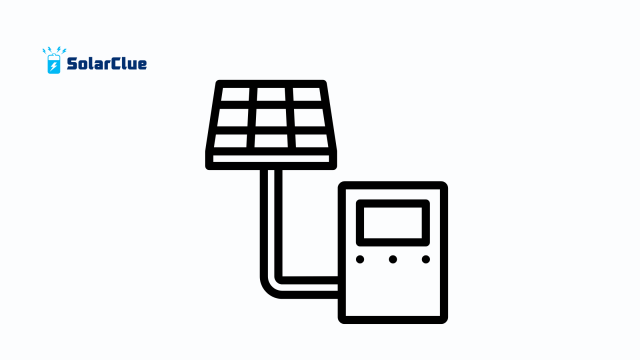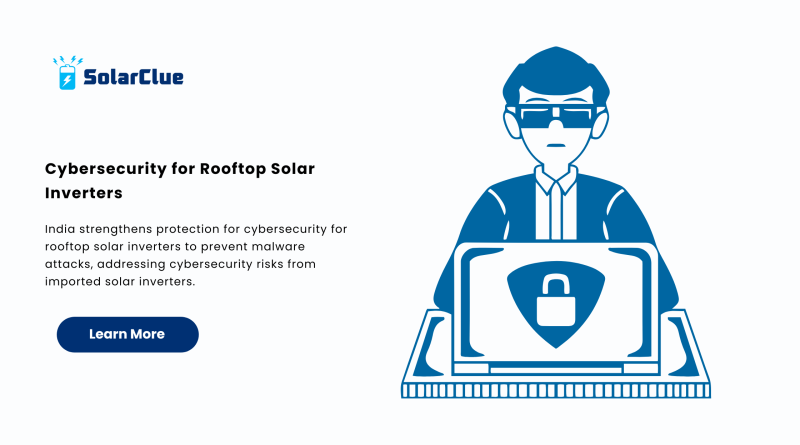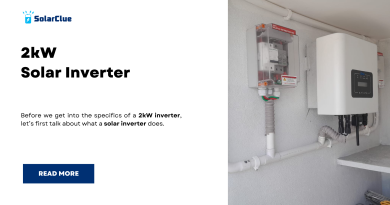India Boosts Cybersecurity for Rooftop Solar Inverters
Cybersecurity for Rooftop Solar Inverters: India’s solar power landscape is evolving rapidly, but along with growth comes new challenges. One major concern is the cybersecurity risk posed by rooftop solar inverters. With 1.8 million rooftop units already online and a target to cover 10 million homes by 2027, the government has taken firm action to protect the nation’s grid from potential cyber threats.
Table of Contents
- 1 Cybersecurity Risks in Rooftop Solar Systems
- 2 New Government Guidelines to Secure the Grid
- 3 Why Rooftop Solar Inverters Need Protection
- 4 India’s Ambitious Solar Goals
- 5 Global Concerns Over Imported Inverters
- 6 What It Means for Homeowners and Installers
- 7 How to Ensure Your System Is Compliant
- 8 Looking Ahead: A Safer Solar Future
- 9 FAQs
Cybersecurity Risks in Rooftop Solar Systems
Solar inverters, especially rooftop ones, play a critical role in converting the direct current (DC) produced by solar panels into usable alternating current (AC) for homes and the national grid. As these systems become smarter and more connected, they also become targets for cyberattacks. India’s Ministry of New and Renewable Energy (MNRE) has introduced new measures to eliminate vulnerabilities in these devices, especially those imported from China. Many of these inverters send consumption and generation data to foreign servers, raising serious concerns about unauthorized control and data leaks.
New Government Guidelines to Secure the Grid
To address these risks, MNRE has rolled out a set of mandatory guidelines. All solar inverters must now connect to a national software platform, hosted on Indian servers and managed by a government-approved agency. This ensures that data remains within the country. Additionally, inverter communication modules must use secure machine-to-machine (M2M) SIM cards to restrict data access and prevent unauthorized transmission. These updates mark a significant move toward securing India’s solar infrastructure and safeguarding national energy interests.
Why Rooftop Solar Inverters Need Protection
Compared to large-scale utility systems, rooftop solar installations often lack stringent security checks. According to a report by the India Smart Grid Forum, more than 80% of rooftop inverters installed in India originate from Chinese companies. These inverters pose the greatest vulnerability because they often include communication modules that transmit data outside India. The government’s move intends to prevent such risks while promoting better control over the nation’s power infrastructure.
India’s Ambitious Solar Goals
India plans to install rooftop solar systems in 10 million homes by March 2027 under the PM Surya Ghar Yojana. This initiative aims to generate 30 gigawatts of clean energy while empowering households with cost-saving solutions. To meet this target securely, every component—from solar panels to rooftop solar inverters—must be trustworthy and cyber-resilient.
Global Concerns Over Imported Inverters
India’s concerns reflect a global trend. The United States has also raised alarms about Chinese-manufactured solar equipment, especially after detecting suspicious communication components. These concerns highlight the importance of securing solar technology in an era where energy and data are deeply intertwined. Countries across the world are working to make sure their green energy systems don’t become entry points for cyber threats.
What It Means for Homeowners and Installers
Homeowners using rooftop solar systems should now ask installers about the compliance of inverters with the new guidelines. Using inverters that meet the government’s security standards ensures safer energy usage and reduces the risk of data breaches. For installers and suppliers, aligning with these regulations not only builds trust with customers but also opens the door for partnerships with approved and local manufacturers. The transition may also boost Indian production of secure solar equipment.

How to Ensure Your System Is Compliant
Check the brand and communication method of your existing solar inverter. If it uses foreign servers or standard SIM cards, it may not comply with the new norms. Ask your installer to verify compatibility with the government platform and use of secure M2M SIMs. For new installations, always request Indian-made or government-approved components. These steps will not only keep your data safe but also help maintain grid stability across the country.
Looking Ahead: A Safer Solar Future
India’s step toward securing rooftop solar inverters is a proactive move to support the growth of solar power without compromising national security. As more homes shift to renewable energy, ensuring data protection will become just as important as energy generation. These new regulations protect both consumers and the grid, paving the way for a more secure, self-reliant, and energy-efficient India.
FAQs
Q1. Why are rooftop solar inverters at risk of cyberattacks?
Because they are often internet-connected and lack sufficient cybersecurity protocols, making them easier to access remotely.
Q2. What new measures has the Indian government introduced?
The government requires all rooftop solar inverters to connect to a national software platform and use secure M2M SIM cards for communication.
Q3. Are imported inverters banned in India?
No, but inverters that transmit data outside India or don’t meet security criteria are discouraged under the new guidelines.
Q4. What is an M2M SIM card in this context?
It’s a special type of SIM card designed for secure, machine-to-machine communication without human interference.
Q5. How can homeowners ensure their systems are secure?
They should confirm with their installer whether their solar inverter complies with the new regulations and doesn’t send data to foreign servers.
India is rising as a global solar leader—and security is now part of that growth story. If you’re planning to switch to solar or want to ensure your system is fully secure, take action today. Explore safe, efficient, and future-ready solutions by visiting solarclue.com or get deep insights on blog.solarclue.com. Let’s power your home with sunlight and security together.




